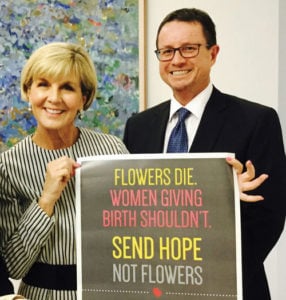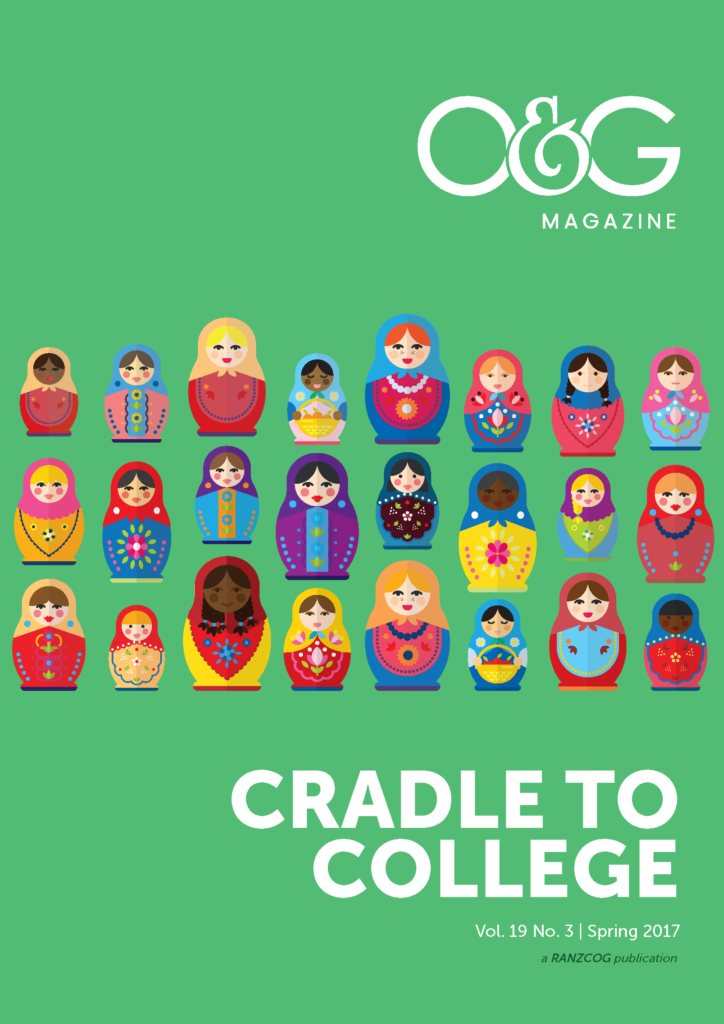I hope you have all managed to stay warm and, hopefully, taken some time off with family or friends over winter. Spring is a time of hope and excitement, and this issue of O&G Magazine takes the very important area of paediatric and adolescent care as its theme. This is a fascinating area of practice – we commonly deal with vulnerable patients and anxious families, yet this is something many of us won’t have a lot of experience in. As always, the editorial team has drawn together a group of experts and brought us a wonderful update on a critical area.
National Framework for Maternity Care
Over the first half of 2017, the Queensland Government Health Department, in conjunction with Deloitte, attempted to develop a National Framework for Maternity Care here in Australia. The project was characterised by a lack of consultation at every point, and the outcome was predictable. Over the course of the document’s development, it became clear that the working party had achieved what I thought was completely impossible – uniting all the major ‘stakeholders’ in maternity care. Groups from across the spectrum, from your College to the AMA and groups such as Maternity Choices, were united in rejecting the process. That is quite an achievement. In previous columns I have raised significant concerns with the Framework project and so it was pleasing to see that the project has been scrapped – for now. So stunning was the rejection that it was reported across the media.
The entire process of the Framework development brought home a number of important points. It emphasised the critical importance of working with providers of maternity care, rather than trying to work around them, to achieve a political aim. It emphasised the importance of working to a goal: at no stage was it made clear exactly what the proposed Framework was meant to achieve. Perhaps most importantly for us, though, was the fact that the College did not have a single inclusive document that articulated a cohesive, evidence-based view of how we think maternity care should be provided. That became our project.
Over the first half of the year, in parallel with the Queensland Government’s and Deloitte’s processes, the College has begun working on its own framework document. We have done this in consultation with important providers of maternity care that had been overlooked by the Government. Contributors to this project have included the specialist colleges of anaesthetists, psychiatrists, rural and remote medicine, general practitioners, pathologists, and many more. By the time you read this, it should be possible to take a look at your own College document on our website. Let’s keep our fingers crossed that the ill-fated Framework will have inspired a useful result in the end.
Mesh Inquiry
As many of you will know, the Australian Senate has been conducting an inquiry into the use of transvaginal mesh. It has been a highly politicised process, with use of mesh described as ‘a medical scandal’ and ‘the new thalidomide’ by some Senators. After an enormous effort by many Fellows, particularly Dr Peta Higgs and members of her Urogynaecology Subspecialty Committee, the College submission to the Inquiry was finalised. We were also able to work with Medibank Private to obtain data regarding long-term re-operation rates following use of transvaginal mesh. The College’s submission and other information and resources in relation to pelvic mesh are available on the College website at www.ranzcog.edu.au/Mesh-Resources.
On 3 August, the first of the public hearings were held in Melbourne. It is likely that the College will be asked to appear before the Inquiry in the near future. I am not sure what the outcome of the Inquiry will be, but I am fervently hoping that the place of mid-urethral slings for stress urinary incontinence will be upheld, as the evidence clearly tells us it should be. As these events play out, I will keep you regularly updated.
Global Health
Our College is dedicated to the health of women in our region, and provides support in many ways. The Pacific Society for Reproductive Health held its conference in Vanuatu in July, and I will be spending time in Port Moresby in early September (about the time this issue of O&G Magazine arrives in your mailbox) along with the Presidents of RACS and ANZCA. High on the agenda of that visit will be how our College can further contribute to women’s health across Papua New Guinea (PNG). In another role, I am on the Board of a maternal health charity (www.sendhope.org) that raises money to support projects in PNG and elsewhere. I recently had the pleasure of meeting with Australia’s Foreign Minister, Hon Julie Bishop MP, to discuss Australia’s role in the Pacific. Expect more about this over the coming year.

Prof Robson with Australia’s Foreign Minister, Hon Julie Bishop MP, at her Parliament House office. RANZCOG can play a key role in global women’s health.
Revalidation
By the time you read this article, the Medical Board of Australia (MBA) will have released the first draft of its recommendations for revalidation in Australia. Similar documents will be coming from the Medical Council of New Zealand (MCNZ). It is expected that the College will take the lead in providing tools and processes for revalidation in both countries. I have met with the MBA Chair, Dr Joanna Flynn, a number of times about this, most recently in Canberra. One of the main aims of revalidation – identifying practitioners who are at risk of causing harm to patients – remains an elusive goal. I will keep you updated on the College’s response to proposals from both the MBA and MCNZ.
Professional Services Review
For much of its existence, the Professional Services Review (PSR) dealt largely with GPs who were thought to have unfairly accessed MBS item numbers through Medicare. However, the new Chair, Prof Julie Quinlivan, is a Fellow of our College. There is a new focus on specialist practice, and it is important that all Fellows and Diplomates of the College understand this. Medicare has new and sophisticated software that can identify doctors who are outliers in their use of MBS item numbers. Where there is a suspicion that MBS item numbers are being used inappropriately, the PSR can initiate an investigation and audit process. Your best protection against this is simple – rational, evidence-based, and fair use of MBS item numbers. I met with Prof Quinlivan and have invited her to promote the work of the PSR to our Fellowship.
It’s spring – forget the doom and gloom
I had the pleasure of visiting Cairns for the annual Queensland/New South Wales Regional Scientific Meeting. It was a warm and welcome respite from the unremitting cold of Canberra in the midwinter. The meeting was wonderful and it gave me the opportunity to speak with Fellows and trainees about the issues of importance to them. The viability of private practice, indemnity costs, our relationship with professional colleagues, such as midwives, procedural training for registrars… the list goes on. I’m pleased to say that I could reassure everyone I spoke to that the College is doing work in all of these areas. I hope that you all enjoy spring, and I look forward to writing again just before the Christmas break.





Leave a Reply